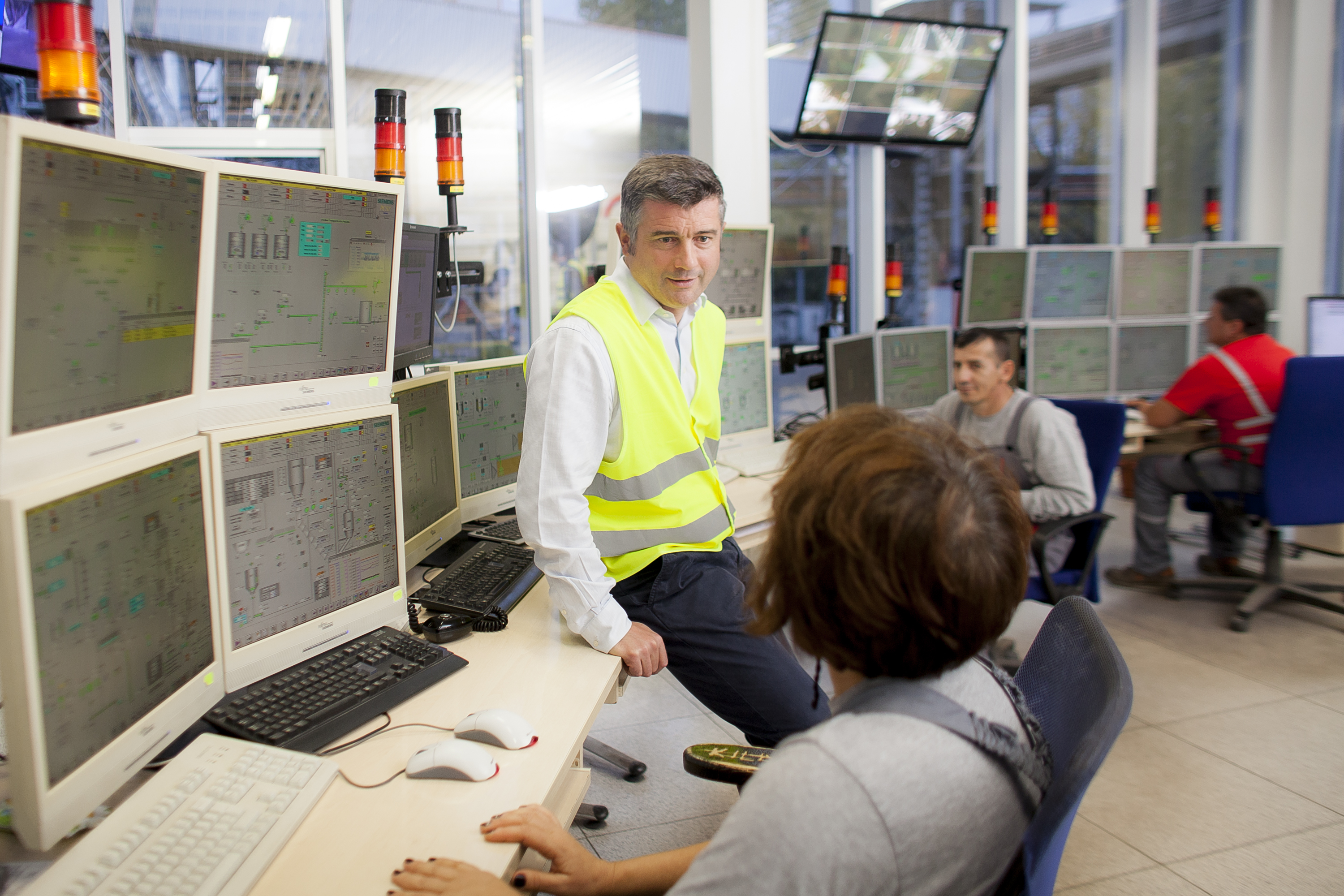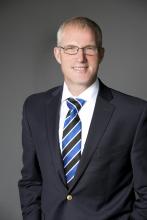
Innovation is at the heart of Aggregate Industries, a leading player in the UK construction and infrastructure industries and a key company within the LafargeHolcim group. Here, Aggregate Industries CEO, François Pétry, explains to Guy Woodford how the company’s development of ground-breaking building products will help position it in the markets of tomorrow.
Founded in 1858,
“The second is a focus on asset management and having a more holistic view of how best to utilise assets across all projects, not only during the construction process but to enhance the longer-term performance.
“With these changes starting to happen now, we may see some products be replaced or different production processes introduced in the years to come. However, it is clear that as an industry, we must embrace these changes and evolve – if we do this the sector will continue to thrive.”
Pétry, a French national, says Aggregate Industries regularly brings new building materials products to the market to better suit the needs of the company’s customers, such as new asphalt mixes or concrete products.
“We are currently exploring new products in which the characteristics of our ground-breaking secondary aggregate,
Aggregate Industries recently launched its 2018 innovation strategy, with Pétry a passionate believer in its importance to the company’s ongoing commercial success.
“Our innovation strategy for 2018 sets out our priorities for the year ahead and beyond. In the past, without a formal structure, innovation was harder to define and it was tough to filter ideas. Using our six focus areas, we can proactively and more closely work with our innovation partners to further our developments.”
The strategy’s six key areas of focus include Robotics and Artificial Intelligence (AI), Virtual and Augmented Reality (VR & AR), Digital Engineering, Smart Materials, Offsite Construction and Blockchain.
“We chose to focus our energies on these innovations due to their potential to positively impact our sector,” explains Pétry. “For example, smart materials could be revolutionary, especially for construction, as they will enable companies to look beyond just functionality and into a world where materials can provide a range of additional benefits. What’s clear, is that our innovation journey will be underpinned by digital transformation; supported by technology and empowered by data, as we and our customers operate in an increasingly digital environment.”
In line with the launch of the 2018 innovation strategy, Aggregate Industries held its annual innovation workshop, which was hosted by Loughborough University. Senior managers from across the business and LafargeHolcim Group, including the global head of innovation, came together to collaborate with academics to identify viable commercial opportunities within each of the key strategic areas.
“To be truly innovative, we know that we must work together to think beyond products and focus on potential applications which could bring benefits to our customers and also improvements to our own operations,” says Pétry, who has an engineering degree from the Ecole Nationale Superieure D’Arts et Metiers at ParisTech. “The innovation workshop allowed us to do this and to learn from and engage with academics from outside the construction sector who are leading the way within the innovation areas we are committed to pursue as a forward-thinking business.”
Automated technology has had a huge impact on the global quarrying, mining and construction equipment industry. Curious to know its impact on Aggregate Industries’ operations, I ask Pétry whether automated technology has enabled the company to do things that it could not before.
“From robotic process automation to machine learning and autonomous vehicles, there are vast opportunities for the construction sector. A use of technology that we are in the early stages of utilising is drones, which are allowing us to measure our onsite stocks. We are only at the start of our journey into fully understanding the potential of these advancements and are learning more each day how we can better leverage these to both our own and our customers’ advantage.”
Pétry says technology, and businesses’ ability to transact digitally, are also creating efficiencies within Aggregate Industries’ internal business processes. “We are starting to understand practical uses for technologies that will positively impact our employees and customers. For example, we are in the early stages of developing VR health and safety inductions, as well as training modules.”
Turning his attention to the current trading performance of Aggregate Industries, Pétry acknowledges that is has been a challenging time for the whole building products industry.
“We are continuing to witness the fallout from Brexit, a weakening pound and a growing skills shortage. However, during this time, my focus has been on nurturing a culture of stability and strength, ensuring that we continue to innovate, invest in our people and push boundaries in modern construction practices. To this extent, I am proud of the fact that we have been able to continue to lead with confidence in today’s challenging market, adapting to the changing environment and reinforcing our position as a market leader.”
Of growth drivers within the UK building products market, Pétry says: “We are confident that the UK will remain strong as there is a clear long-term requirement for housing and large-scale infrastructure projects and a clear commitment from the government to deliver these. In turn, we will continue to bring our best construction solutions and services to the market to help deliver these projects and this is where we see potential growth for our business.
“Looking further ahead, once these requirements are met, there will still be an obligation within these markets to improve the sustainability and durability of housing and infrastructure, which will create ongoing opportunities for our sector.”
Having an eye on the future was a key reason behind Aggregate Industries’ recent acquisition of the Kendall Group, a leading aggregates and ready-mix concrete manufacturer with net sales of around £25 million in 2017, operating in southern England.
It will enable Aggregate Industries to expand its operations in southern England, which is expected to benefit from above national average growth, especially in the housing segment.
It will also enable the company to enter the dredging business and secure a long-term position in an attractive market segment.
Pétry explains how Aggregate Industries has a strong commitment to improving its customer service, whether through increased speed of delivery, via technology that allows customers to track deliveries in real time, or through the support the company provides its customers in the implementation of their projects.
In order to ensure a consistently high level of customer service throughout the UK, Petry says the company has been restructuring its sales back offices into regional customer centres, which are equipped with the latest technologies to ensure the firm is more efficient in dealing with requests. This also allows for greater collaboration across all of its business divisions, enabling Aggregate Industries to offer its customers complete product solutions for their entire projects.
Safety is one of the top priorities at Aggregate Industries. This, highlights Pétry, led to the recent launch of a driving style rewards programme for the company’s hauliers. “We have recently installed the Teletrac Navman GPS reporting system in all vehicles within our fleet to mainly help improve efficiencies on site, by tracking deliveries and collections. However, the system can also monitor driving behaviours and styles and our new recognition scheme will be based on scorecards that reward safe driving.
“Each month, the top three drivers in each UK region will be announced and each quarter the top haulier will be named. There will also be annual awards, which will include Aggregate Industries Driver of the Year and Top Haulier of the Year – all award winners from across the year will receive prizes for their achievements.
“We monitor the number of incidents involving our vehicles and expect this low figure to decrease further, but this initiative is primarily about encouraging consistent and safe driving and recognising those drivers committed to safety and achieving operational best practice.”
Pétry joined Aggregate Industries as chief executive officer in December 2015. He has extensive experience in the quarrying industry having worked as CEO of LafargeHolcim Romania, overseeing the growth of the business in a challenging market. Prior to that, he was general manager for Aggregates Holcim in France, holding the role from 2008-2014. He has also previously held senior positions across the French infrastructure, construction and waste industries.
Speaking of what attracted him to the role of Aggregate Industries CEO and what he enjoys about working in the UK building materials industry, Pétry says: “My first experience of Aggregate Industries and the group it is part of, LafargeHolcim, was when I was working in France, as I was involved in selling some of the company’s materials there. From early on, it was clear that it was a progressive, innovative and incredibly ambitious business, which had a vast experience and repertoire across the entire construction supply chain. When offered the chance to become directly involved with the organisation, I saw it as a unique and exciting chance, so I grabbed it with both hands.”
Pétry says there are differences between the UK and the European markets, both culturally and in the historical set-up of the industry. “What stands out to me is the high level of professionalism within the UK market, no matter where you operate within the value chain.
“I enjoy working in the industry due to the diversity it offers in terms of the people you interact with and the different types of challenges our customers face. The market continues to evolve, which allows us to do the same. We also have strong competition in the UK, so we always have to stay ahead of the curve and continue to push ourselves to perform better and deliver a first-class service to our customers.”
Pétry says his leadership style at Aggregate Industries has been shaped by his keenness to create a strong team spirit, while also creating efficiencies and driving competitive business performance. “My leadership challenge has been to establish the right mix between internal and external activities, as it is important for me to bring value to our business, operations and ultimately to our customers. I ensure I spend time out in the market interacting with our customers in order to truly understand and hopefully solve the challenges they face.”
So what is Pétry still looking to achieve as Aggregate Industries CEO? “I aim to further prepare and position Aggregate Industries in the markets of tomorrow through a sustained high level of service and new innovations which benefit both ourselves and our customers. I am also focused on ensuring we remain an attractive company to work for, in which our people continue to perform well, can embrace their entrepreneurial spirit and have fun working together to meet shared goals.”









